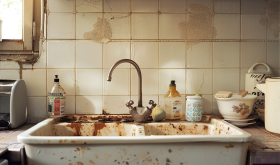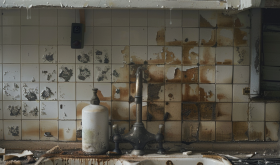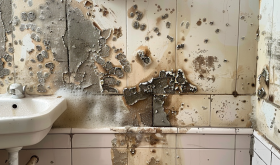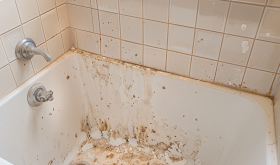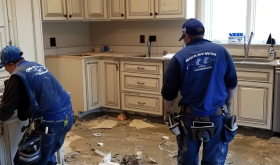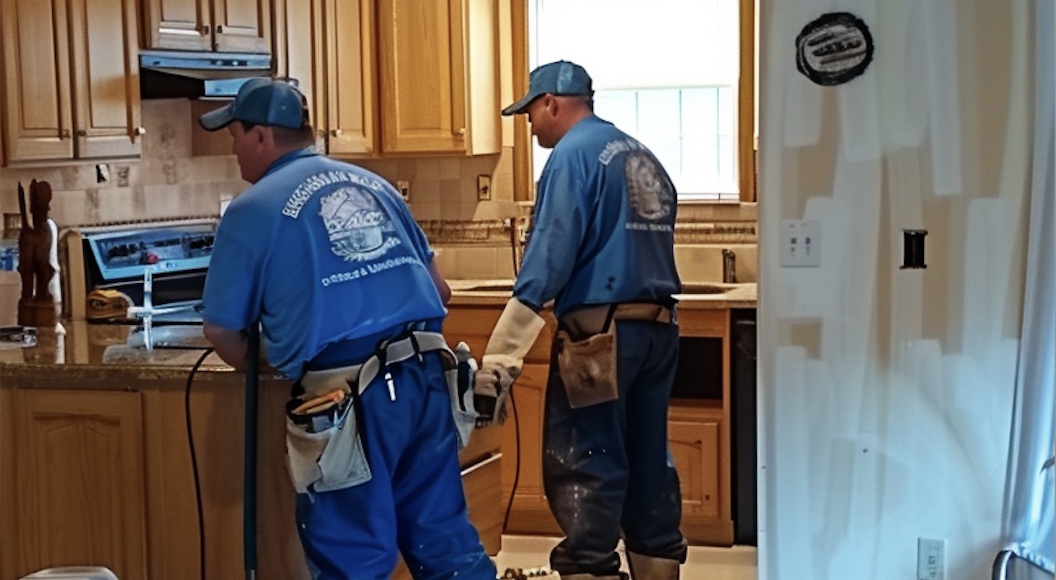
Water damage can strike at any time, whether from a burst pipe, a leaky roof, or a flooding incident. When water intrudes into your home or business, it can cause extensive and costly damage if not addressed promptly and properly. Acting quickly and following a comprehensive approach is crucial to mitigate the impact and prevent further issues. Here’s a comprehensive guide on how to handle water damage effectively:
-
- Safety First
Before taking any action, ensure the safety of everyone on the premises. If the water damage is severe and involves contaminated water (such as sewage backup), evacuate the area immediately and contact professional assistance. Exposure to contaminated water can pose serious health risks, and attempting to clean it up without proper protective equipment and training can be hazardous.
- Safety First
-
- Stop the Water Source
Once everyone is safe, your next priority should be to identify and stop the source of the water intrusion. This could involve turning off the main water supply line, repairing a broken pipe, or addressing a leaky roof. Stopping the water flow is crucial to prevent further damage and facilitate the drying process.
- Stop the Water Source
-
- Call for Professional Help
While you may be tempted to handle the water damage yourself, it’s often best to seek the expertise of a professional water damage restoration company. These companies have the necessary equipment, training, and experience to effectively assess the situation, extract the water, dry the affected areas, and prevent secondary damage, such as mold growth.
- Call for Professional Help
-
- Document the Damage
If you plan to file an insurance claim for the water damage, it’s essential to document the extent of the damage thoroughly. Take photos and videos of the affected areas, and keep a detailed record of the events leading up to the water damage incident. This documentation will be crucial in supporting your insurance claim.
- Document the Damage
-
- Water Extraction
The first step in the restoration process is to extract as much standing water as possible. Professional water damage restoration companies use powerful pumps and truck-mounted vacuum units to quickly remove large volumes of water from the affected areas. This step is crucial to minimize the potential for further damage and facilitate the drying process.
- Water Extraction
-
- Drying and Dehumidification
After extracting the standing water, the next step is to thoroughly dry and dehumidify the affected areas. Professional restoration companies use specialized equipment, such as high-velocity air movers and dehumidifiers, to remove moisture from surfaces, walls, and other materials. This process is essential to prevent mold growth and structural damage.
- Drying and Dehumidification
-
- Mold Remediation
If mold growth has already occurred, it’s crucial to address it promptly. Mold can cause serious health issues and further damage to your property if left unchecked. Professional water damage restoration companies have the expertise and equipment to safely and effectively remediate mold, ensuring that your property is restored to a healthy and safe condition.
- Mold Remediation
-
- Cleaning and Sanitizing
Once the affected areas are dry and any mold issues have been addressed, the next step is to thoroughly clean and sanitize the affected surfaces and materials. This may involve using specialized cleaning solutions and techniques to remove any remaining contaminants or odors.
- Cleaning and Sanitizing
-
- Restoration and Reconstruction
Depending on the extent of the water damage, some materials or structures may need to be repaired or replaced. Professional water damage restoration companies can handle this phase, ensuring that your property is restored to its pre-damage condition or better. This may include reconstructing drywall, replacing flooring, or making necessary repairs to structural elements.
- Restoration and Reconstruction
-
- Prevention and Maintenance
After the water damage restoration process is complete, it’s essential to take preventive measures to avoid future incidents. This may involve addressing any underlying issues that caused the water damage, such as fixing plumbing leaks or improving drainage systems. Regular maintenance and inspections can also help identify potential problems before they escalate into major water damage events.
- Prevention and Maintenance
Handling water damage effectively requires a prompt and comprehensive approach. By following these steps and seeking the expertise of professional water damage restoration companies, you can minimize the impact, prevent further issues, and restore your property to a safe and habitable condition.
It’s important to act quickly when water damage occurs, as delays can exacerbate the situation and lead to more extensive and costly repairs. Additionally, prompt action can help prevent secondary issues, such as mold growth, which can pose serious health risks and further damage to your property.
While it may be tempting to attempt to handle water damage yourself, it’s often best to involve professionals who have the necessary training, equipment, and experience to address the situation effectively. Professional water damage restoration companies can quickly assess the extent of the damage, implement the appropriate drying and remediation techniques, and ensure that your property is restored to its pre-loss condition.
Remember, water damage can be a significant and overwhelming problem, but with the right approach and professional assistance, you can minimize the impact and protect the integrity of your home or business.

